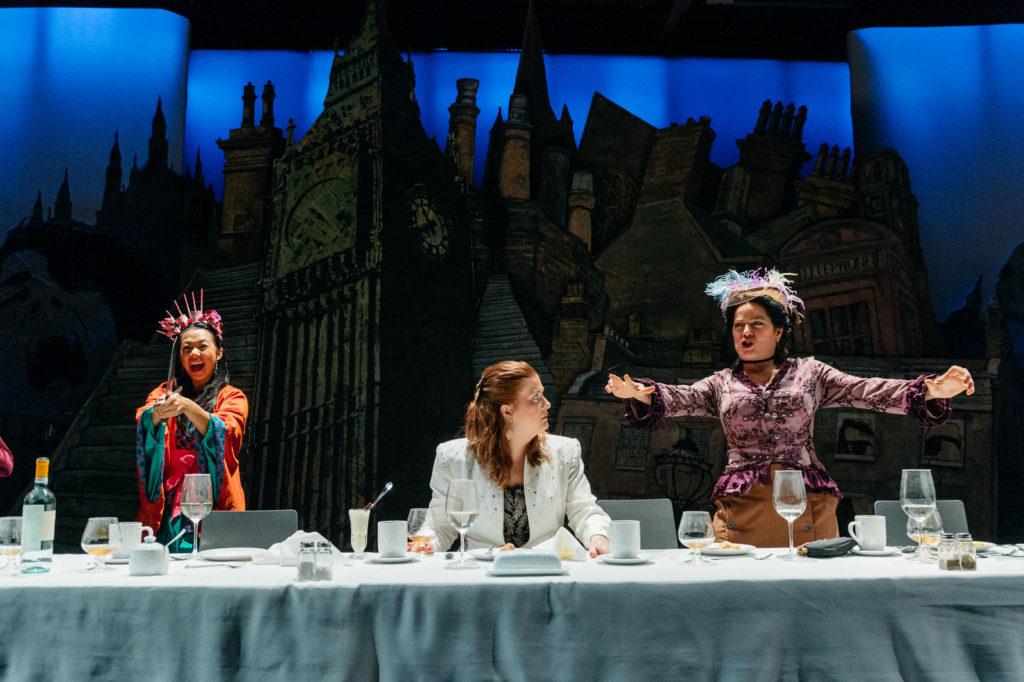
First staged in London in 1982, “Top Girls,” written by Carly Churchill, is reborn at the Keegan Theatre in Washington, D.C. The play chronicles the story of Marlene, a young woman living in Britain in the 1980s, as she works her way up the ladder in the business world in the face of sexism. Directed by Amber Paige McGinnis, the play unfolds in a different time period yet still conveys a universal message about the realities and challenges women face when balancing work and motherhood. “Top Girls” does not present an empowering tale of feminism and female friendship, but rather tackles the difficult subjects of competition between women and strained mother-daughter relationships.
In Act I, Marlene hosts a dinner with five historical and fictional female characters: Flemish warrior Dull Gret; 13th-century Japanese concubine-turned-monk Lady Nijo; English world traveller Isabella Bird; Patient Griselda, an obedient wife from “The Clerk’s Tale” in Geoffrey Chaucer’s late 14th century “The Canterbury Tales”; and Pope Joan, a legendary Englishwoman who disguised herself and became a pope. The characters discuss their marriages and life journeys with Marlene and one another. Although they come from different eras and regions of the world, they face many of the same issues.
During the dinner, the women often talk over one another and attempt to minimize one another’s experiences. Instead of fostering a culture of empowerment, the dinner is characterized by a cold, competitive atmosphere, showing how women sometimes feel as though they must compete with one another to achieve equality.
In Act II, the change of setting transports the audience into Marlene’s sister’s backyard, where the audience meets Marlene’s nieces, Angie and Kit. The two girls openly discuss death and menstrual cycles, contrasting the hushed, cautious conversations among adults elsewhere in the play.
In one scene, Angie defies her mother, Joyce, with whom she is in constant conflict, to escape and visit Marlene. This subplot emphasizes the often-strained relationships that can exist between mother and teenaged daughter. Motherhood and mother-daughter relationships are a recurring motif in the play, and the play shows that mothers must often sacrifice to support their families.
The third act, which takes place at Marlene’s employment agency, is particularly relatable, because the audience is able to observe the problems women face in the corporate world.
The recurring theme of competition between women shows prominently in Act III, because although the agency is run by women, it often rejects female clients or doubts their abilities to work in more challenging fields. At the end of the act, Marlene speaks about her niece, bitterly saying, “She’ll never make it.” This line is reflective of the vicious cycle in which adult women overcome their challenges and yet still do not empower young women to do the same.
The tense dialogue and sense of resentment between Marlene and her sister and nieces in this act, as well as throughout the play, make the audience wonder whether success in the corporate world and success as a mother are mutually exclusive.
Although no men appear as characters or as actors in the play, men are often the subject of conversation. During Act I, the women discuss how they feel obliged to complete their wifely duties. In Act III, the employment agency essentially helps men find higher-level jobs, instead of helping women seeking work. In this way, the play leaves viewers with the impression that women contribute to the “glass ceiling.”
Rather than being an empowering feminist play, “Top Girls” explores complex issues with which women struggled during the 1980s and which continue to affect women today. The play takes a challenging route in that it delivers an unfiltered, pessimistic social commentary on the ways in which we often conform to norms rather than challenging them.
“Top Girls” is running at the Keegan Theatre until Dec. 2. Tickets can be purchased online.



















